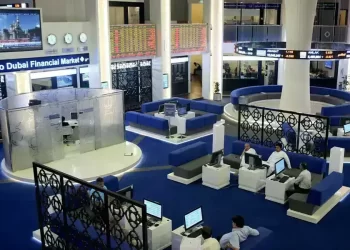
UK shares edged higher on Friday, ahead of a key US inflation print for signals on the scope of Federal Reserve’s interest rate cuts, and the market was set for weekly gains as China’s aggressive stimulus measures lifted mining and luxury stocks.
At 0710 GMT, the bluechip FTSE 100 index was up 0.1%, while the domestically-focused FTSE 250 midcap index rose 0.4%.
The personal goods sector led gains, while banks were the biggest decliners, down 0.5%.
Investors now await the US personal consumption expenditures (PCE) price index – the Fed’s preferred measure of inflation – later in the day, with the size of the next rate cut in November still up for debate.
Both UK indexes were set for weekly gains, with FTSE 100 on track to rise 0.7% and the midcap index to gain 1.3%, buoyed by hopes for a turnaround in the Chinese economy after policymakers this week announced numerous aggressive stimulus measures.
In the latest move, China’s central bank on Friday lowered interest rates and injected liquidity into the banking system, with more fiscal measures expected to be announced before China’s week-long holidays starting on Oct. 1.
Mining shares have jumped this week as hopes for increased demand from China lifted metal prices, with an index of London-listed industrial miners rising more than 11% this week.
FTSE 100 drops over 1pc on strong retail sales
Similarly, gains in China-exposed luxury retailers such as Burberry lifted the personal goods index about 12% this week. Still, the FTSE 100 has lagged the European benchmark STOXX 600, which is on track for weekly gains of more than 2%.
Among individual stocks, Cranswick rose 1.6% after the meat producer forecast its annual profit towards the upper end of market expectations.

UK shares edged higher on Friday, ahead of a key US inflation print for signals on the scope of Federal Reserve’s interest rate cuts, and the market was set for weekly gains as China’s aggressive stimulus measures lifted mining and luxury stocks.
At 0710 GMT, the bluechip FTSE 100 index was up 0.1%, while the domestically-focused FTSE 250 midcap index rose 0.4%.
The personal goods sector led gains, while banks were the biggest decliners, down 0.5%.
Investors now await the US personal consumption expenditures (PCE) price index – the Fed’s preferred measure of inflation – later in the day, with the size of the next rate cut in November still up for debate.
Both UK indexes were set for weekly gains, with FTSE 100 on track to rise 0.7% and the midcap index to gain 1.3%, buoyed by hopes for a turnaround in the Chinese economy after policymakers this week announced numerous aggressive stimulus measures.
In the latest move, China’s central bank on Friday lowered interest rates and injected liquidity into the banking system, with more fiscal measures expected to be announced before China’s week-long holidays starting on Oct. 1.
Mining shares have jumped this week as hopes for increased demand from China lifted metal prices, with an index of London-listed industrial miners rising more than 11% this week.
FTSE 100 drops over 1pc on strong retail sales
Similarly, gains in China-exposed luxury retailers such as Burberry lifted the personal goods index about 12% this week. Still, the FTSE 100 has lagged the European benchmark STOXX 600, which is on track for weekly gains of more than 2%.
Among individual stocks, Cranswick rose 1.6% after the meat producer forecast its annual profit towards the upper end of market expectations.








